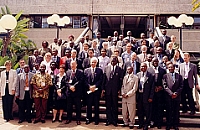Expert Group Meeting on Secure Land Tenure: New Legal
Frameworks and Tools
UN-Gigiri, Nairobi, Kenya, 10–12 November 2004
 |
The participants of the Expert Group Meeting in
Nairobi. In the first row, starting fourth from the left and continuing
to the right: Clarissa Augustinus (chief Land Tenure Section
UN-HABITAT), Paul van der Molen (chairman of Commission 7,
‘Cadastre and Land Management of the International Federation of
Surveyors), Daniel Biau (deputy executive director of
UN-HABITAT), Hon. J. Orwa Ojode (Assistant Minister for Lands and
Settlement in Kenya) and Ibrahim Njiru Mwathane (president of the
Institute of Surveyors of Kenya). |
The subject of this Expert Group Meeting was the improvement of land
tenure security through new legal frameworks and new and better tools. New
land laws have recently come into power, others are under development. What
kind of tools do we need to adequately support the spirit and letter of
these new legal frameworks? What are the innovative ideas about information
systems and work processes? How can we improve existing land administration
systems?
Thus, the aim of the meeting was to:
- discuss new legal frameworks for the improvement of land tenure
security
- discuss new ideas about tools that may support the implementation of
these new legal frameworks
- discuss evolutionary approaches for recording and mapping land tenure
forms
- discuss possibilities to improve existing land administration systems
- learn from other countries that face the same challenges
- summarise the experiences and ideas in the form of a booklet that will
be widely distributed
- develop a research agenda for a network of research institutes in the
region
- encourage decision makers to pay adequate attention to the
implementation aspects of land policy.
A group of about 60 experts – social scientists, anthropologists, lawyers
and surveyors – discussed these issues in Nairobi. The meeting was organised
by the FIG Commission 7, Cadastre and Land Management, UN-HABITAT, the
Institution of Surveyors of Kenya (ISK) and the Commonwealth Association of
Surveying and Land Economy, with support from the Austrian Development
Agency, the Netherlands Ministry of Foreign Affairs, the German Technical
Co-operation (GTZ) and the Netherlands Cadastre, Land Registry and Mapping
Agency.
During the meeting some observations regarding various forms of land
tenure were made. First of all it could be concluded that countries in
Africa are indeed innovative in finding appropriate forms of land tenure
that aim at meeting local needs.
In general, there is an understanding that informal forms of land
delivery are effective in cases where formal land delivery simply does not
work. The question, whether the poor can benefit from either formal or
informal land delivery processes, has been answered quite disappointingly:
the poor do not benefit. Their only chance is plot sharing with parents and
plot ownership through inheritance.
The combination of formal land delivery processes and customary
approaches is identified as a neo-customary land delivery process, which
seems to be a good alternative to formal processes, although the viability
in the long term has been questioned because of the unclear compatibility
within formal land policies.
Conclusions
Firstly, it has become clear that regarding rights to land, registration
and cadastre, and technology, all options are open: nothing should remain
unexplored for the sake of identifying innovative approaches to meeting the
demands of the people. This includes informal land delivery mechanisms,
although it has been recognised that these systems have weak aspects, which
possibly should be repaired. It is remarkable that many countries embark on
an evolutionary approach to providing land tenure security (Ethiopia,
Namibia, Rwanda, Lesotho, Indonesia). Further, presentations at the meeting
revealed the importance of inclusion of so-called derived rights in the
process of land delivery (water rights, grazing and pastoral rights).
Experience in Kenya and Uganda shows the attention that should be paid to
implementation effects of new land laws, both in an institutional and
operational way. With regard to financial issues, there are good examples of
using a sensible form of land tax for the funding of land reform and
upgrading programmes. In many presentations, technology (orthophotos,
satellite images, GPS) was reported to provide a good base for operations;
however, some fundamental conditions should be met in order to materialise
the benefits and enjoy return on investments. The help of universities is
indispensable. Good performance of universities is enhanced if they combine
education with research and consultancy. This provides appropriate knowledge
for advice that meets real-world conditions. The same applies to the ICT
industry: developing standards has been reported to be necessary in order to
provide, for example, software packages that can easily be customised to
local needs. Re-inventing the wheel can be avoided in this way. Finally, the
presentations show the importance of understanding the dynamics of land
administration systems, with respect to coping with evolving forms of land
tenure and maintenance issues. Systems should therefore be flexible and
scalable to reap the benefits of investments.
The Expert Group Meeting has provided – in our view – much material on
innovative legal frameworks and technological tools to contribute adequately
to the debate in countries that struggle with the difficult questions of
improving land tenure security within a socially acceptable context and at
affordable costs.
Paul van der Molen
Christiaan Lemmen
FIG Commission 7 |























